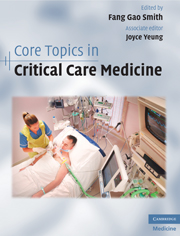Book contents
- Core Topics in Critical Care Medicine
- Core Topics in Critical Care Medicine
- Copyright page
- Contents
- Contributors
- Foreword
- Preface
- Acknowledgements
- Abbreviations
- Section I: Specific features of critical care medicine
- Chapter 1 Recognition of critical illness
- Chapter 2 Advanced airway management
- Chapter 3 Patient admission and discharge
- Chapter 4 Transfer of the critically ill
- Chapter 5 Scoring systems and outcome
- Chapter 6 Information management in critical care
- Chapter 7 Haemodynamics monitoring
- Chapter 8 Critical care imaging modalities
- Chapter 9 Vasoactive drugs
- Chapter 10 Nutrition
- Chapter 11 Pain control
- Chapter 12 Sedation
- Chapter 13 Ethics
- Chapter 14 Organ donation
- Section II: Systemic disorders and management
- Section III: Organ dysfunction and management
- Section IV: Examinations
- Index
Chapter 9 - Vasoactive drugs
from Section I: - Specific features of critical care medicine
Published online by Cambridge University Press: 06 July 2010
- Core Topics in Critical Care Medicine
- Core Topics in Critical Care Medicine
- Copyright page
- Contents
- Contributors
- Foreword
- Preface
- Acknowledgements
- Abbreviations
- Section I: Specific features of critical care medicine
- Chapter 1 Recognition of critical illness
- Chapter 2 Advanced airway management
- Chapter 3 Patient admission and discharge
- Chapter 4 Transfer of the critically ill
- Chapter 5 Scoring systems and outcome
- Chapter 6 Information management in critical care
- Chapter 7 Haemodynamics monitoring
- Chapter 8 Critical care imaging modalities
- Chapter 9 Vasoactive drugs
- Chapter 10 Nutrition
- Chapter 11 Pain control
- Chapter 12 Sedation
- Chapter 13 Ethics
- Chapter 14 Organ donation
- Section II: Systemic disorders and management
- Section III: Organ dysfunction and management
- Section IV: Examinations
- Index
Summary
Keywords
- Type
- Chapter
- Information
- Core Topics in Critical Care Medicine , pp. 58 - 65Publisher: Cambridge University PressPrint publication year: 2010

